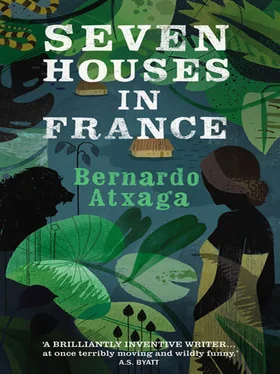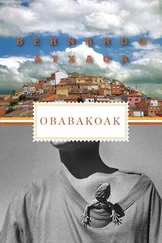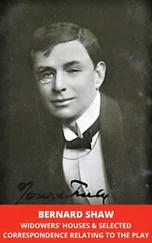It started to rain and he went back inside in order to continue his ponderings at his desk. The royal visit was beginning to seem like a real possibility. There were a few problems, but none were insoluble. It wouldn’t be that difficult to attract a lion to Yangambi if, during the two weeks prior to the visit, bait — in the form of a couple of goats or a few monkeys — was left in an appropriate place. Naturally, it would be best if it was an older lion, or a rather sickly specimen, rather than one bursting with health, because a young, healthy lion capable of leaping thirty feet or more could prove a threat to the King’s safety, which would be to no one’s advantage at all.
In the evening, he got together in the Club Royal with Van Thiegel, Richardson and various other officers. They were more excited about the prospect of seeing the dancer from Philadelphia than about King Léopold’s visit. In the time it takes to drink a martini or a glass of Veuve Clicquot, they were immersed in a passionate discussion about the dancer’s age. Van Thiegel reckoned she was thirty, Richardson, forty.
‘She’s forty if she’s a day, as sure as I’m sixty!’ said Richardson.
He took a piece of paper out of his pocket and spread it on the table. It was a cutting from a magazine published in Monaco and showed a photograph, a close-up of the dancer taken in St-Jean-Cap-Ferrat.
‘There you are, forty if she’s a day!’ Richardson said for the third time.
Van Thiegel raised his martini to the photo. ‘What a beauty!’ he exclaimed.
Richardson turned to Lalande Biran. ‘Although with all due respect, Captain, your wife, Christine, is far more beautiful,’ he declared.
Van Thiegel gave him a shove that almost knocked him off his chair. ‘Show some respect, Richardson!’
‘That’s all right,’ said Lalande Biran. ‘Christine is not averse to compliments.’
He started reading the accompanying article. The journalist was lavish in his praise for the dancer: ‘Born in a humble shack in Missouri, she was merely the flickering flame on a match; that flame is now a great fire that can light up the world like a star, like the star that adorns the flag of the Congo.’
Lalande Biran could just imagine Toisonet dictating these words to the journalist.
That night, in his room, he lay down on his bed with the intention of continuing his thoughts about the Good that the visit might bring or the Bad that might result were the lion to eat the King. However hard he tried to focus on the matter from a pragmatic point of view, his mind insisted on responding in terms more appropriate to poetry. The words ‘a duel between kings’ kept slipping into his thoughts, and his literary instinct was telling him that this could be the title of a poem.
‘A Duel between Kings’. The title demanded to be continued and would not leave him in peace. Finally, after nearly an hour of struggle, he saw the first lines of the poem with absolute clarity and went over to his desk to scribble them down by the light of the oil lamp: ‘A duel between kings. Each in his own territory, but what territory can accommodate more than one king? I am not speaking, Calliope, of the war between white rose and red, nor of that war, years before, in which Hector faced Achilles …’
Feeling calmer, he went back to bed and, in his dreams, again imagined the report of the royal visit that would appear in the European press. In this new fantasy, the photo took up half the page and showed the five protagonists, each carrying a rifle: the King, the dancer from Philadelphia, Stanley, Toisonet and himself. Behind them stood another figure, a man carrying two Albini-Braendlin rifles, one resting on his shoulder and the other raised and ready to fire. He tried to identify that sixth person, but his dream grew confused at that point. This figure was a strong young man, frowning at the camera, squinting into the sun. The first three buttons of his shirt were undone. The blue ribbon and the thick gold chain bearing an image of Our Lady had got tangled up on his chest.
Then the penny dropped. His imagination had wanted Chrysostome, the best marksman in the Force Publique in the Congo, to be there in the newspaper photo. He turned over in bed. Yes, that was the solution. If Chrysostome came with them, one of the kings of that territory, the lion, would be in danger, but not King Léopold.
When he woke, it was raining, and so he rejected the idea of going down to the river and starting the day with a swim. Since he couldn’t go out into the garden either, he went to his office and sat on his chaise longue to wait for Donatien to bring him his breakfast.
He picked up La Gazette de Léopoldville , intending to leaf through it, but couldn’t concentrate. He wanted to examine the room and the state of the furniture.
The chaise longue was attractive, but, being upholstered in a pale grey fabric — pale grey with a pattern of pink roses — it looked very grubby and worn. The King couldn’t possibly sit there. Nor could Toisonet. But they would have to sit somewhere when they visited the house. This was a serious problem, because the other armchairs in the office, especially those on which Van Thiegel and Richardson sat for their meetings, were in an even worse state. Otherwise, the room was light and spacious, and not without charm. With its book-filled shelves and mahogany desk, it looked like the study of a famous poet. And the round mahogany table they used for meetings was equally handsome. However, the problem remained. It would have been good, in the name of traditional values, to offer their visitors authentic African chairs, but most Africans sat on the ground. He would have to find another solution.
The walls of the office were hung with paintings and drawings he himself had made. They couldn’t possibly stay there, because most of them showed naked girls and would offend the priests travelling with the King and Toisonet, especially since the models were all black Africans. He could leave the largest of the paintings, though, depicting the porch of the Club Royal.
Lalande Biran studied the picture. A mandrill was sitting on a rocking chair. There were other mandrills on the river bank and near the storeroom. He had painted it shortly after arriving in Yangambi, and time had left its mark. The edges were blotched with mildew. Oddly enough, one of those spots resembled a monkey.
He glanced at the desk and at the photo of his wife Christine. He thought, half in jest, that her smile was wider than it had been the day before. Christine loved the Court and revelled in the friendship of people like Toisonet. She dreamed of growing richer and richer. If the royal visit did go ahead, she wouldn’t just smile, she would crow with pure delight.
The rhinoceros horn he had exchanged for the watch was there in one corner. He should do something with it. In the right place, it could have a real impact. And if the King expressed an interest, he would give it to him as a gift.
He caught sight of Donatien standing in the doorway, his head almost touching the top of the door frame. He was bringing him his breakfast on a tray: baked bananas, fried eggs, the bread made from manioc flour that the Africans called kikuanga , and coffee.
‘You’d better come and get the tray yourself, Captain,’ he said. ‘My boots are covered in mud and I wouldn’t want to dirty the rugs. It rained a lot last night. I don’t know how much longer it’s going to go on like this.’
He gabbled his words — ‘ Ilser’teilleursiv’prenlerecipien ’ — and his Adam’s apple bobbed up and down.
Lalande Biran put the tray on the round table, with La Gazette de Léopoldville beside it.
‘I think the King’s visit will be a great thing for the Congo, Captain,’ said Donatien from the door. He was taking off his boots. ‘I haven’t read about it myself, but apparently it’s in the newspaper. They say it will be a happy day for everyone here.’
Читать дальше












